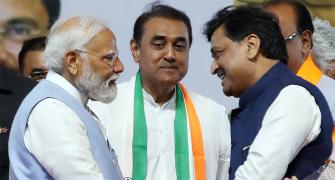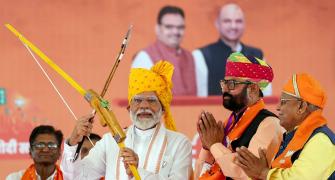There has been discontent about this tax, because any corporate which pays dividend has to pay two taxes - the income tax on its profits and the DDT

The finance ministry is likely to do away with the dividend distribution tax (DDT) in the upcoming Union Budget.
Sources in the know have said there have been considerable discussions on the topic among various stakeholders.
At present, if a company gives dividend to its shareholders, it has to pay DDT of 20.36 per cent (15 per cent plus surcharge and cess).
Two stakeholders, who met Finance Minister Arun Jaitley and Finance Secretary Hasmukh Adhia separately for pre-Budget consultations, told Business Standard that the issue of DDT came up in the meetings that took place between industry representatives and Adhia.
This move, experts say, would help the government in more ways than one - it would boost India Inc’s ease of doing business, encourage firms to give more dividends, and improve returns for retail investors in the lower income tax bracket.
“It is expected that Budget 2018 may propose a withdrawal of DDT and return to the classic system of dividend taxation, that is, dividend income to be taxed at the hands of the recipient shareholders,” said Sonu Iyer, partner and leader, India region people advisory services, EY.
According to Iyer, the case of removal of DDT is the need to make effective corporate tax rate in India compare favourably with competing economies. It also enables foreign investors to get credit of tax in their countries, thereby improving return of investment and ease of doing business in India.
“It also substantially reduces litigation under Section 14A, which disallows expenditure in relation to exempt income,” Iyer said.
DDT was introduced in the Finance Act 1997.
Though the dividend income is tax-free in the hands of investors, since there is a tax incidence before dividend payout, it reduces the returns for taxpayers in the lower tax brackets of 10 per cent and 20 per cent, respectively.
Also, individuals, Hindu Undivided Families, and partnership firms earning more than Rs 1 million in dividend income have to pay an additional tax of 10 per cent plus surcharge and cess.
With this move, the government can achieve the objective of lowering taxation for corporate houses and also improving returns for people in the lower income tax bracket slab, as the dividend would be added to their income and taxed, according to the tax slab.
There has been discontent about this tax, because any corporate which pays dividend has to pay two taxes - the income tax on its profits and the DDT.
However, things worsened in the 2014-15 Budget when the government made changes in the way in which this tax was levied.
Earlier, this tax was computed based on the net amount paid as dividend instead of the gross amount.
As a result, the effective rate of tax was 16.9 per cent.
After the amendment of the Section 115-O, the dividends have to be grossed up, effectively increasing the rate.
“Today, the tax rate for India Inc is 46 per cent, if you include DDT and the corporate tax.
"If you take exemptions, there are a few sectors where the rate goes down, but overall it does not go down for industry as a whole.
"There have been proposals to get DDT back to the earlier regime, where the individual investor was taxed, based on their income tax bracket,” said a person present in meetings with Adhia.
In FY17, the total dividend payout by India Inc (2,880 listed companies) was Rs 1.09 trillion.
And, it has been steadily declining after FY15.
After hitting a high of Rs 1.49 trillion in FY15, dividend payout fell in FY16 and FY17.
Public sector undertakings’ share, however, increased by 550 basis points in FY17.
“There may not be a lot of tax foregone through this move because most retail investors who own stocks and earn good dividends will be in the 30 per cent slab.
"So, the incidence of tax will be higher on them. But, on the other hand, there will be relief for retirees and others who own stocks and earning dividends.
"In all, the tax collections from this source might actually go up,” said another tax expert.
Jaitley had promised in the 2015-16 Budget to phase out exemptions and bring down the corporate tax rate to 25 per cent from 30 per cent.
In the past two Budgets, the corporate tax rate has only been reduced for small businesses.
Finance ministry calculations state that a reduction to 25 per cent, excluding the exemptions, would result in a hit of Rs 700-800 billion to the exchequer.
This is about 13 per cent of the current year’s corporation tax collection budget estimate of Rs 5.3 trillion.
While the corporate tax for big companies is 30 per cent, the effective rate of taxation is close to 23 per cent on account of a large number of exemptions.
The revenue foregone in 2016-17 on account of tax deduction stood at Rs 680 billion.
Photograph: Adnan Abidi/Reuters








